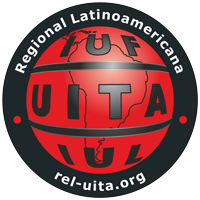A study exposes the multinational corporation inside and out
Syngenta is one of the largest multinational corporations in agribusiness. It is a world leader in the sale of toxic agrochemicals and is among the top suppliers of transgenic seeds. A recent study dissects this Swiss-based Chinese government-controlled mega-company, which currently has Latin America as its strongest market.
Daniel Gatti
27 | 01 | 2023

Illustration: Allan McDonald | Rel UITA
The Syngenta Group is relatively new. It was born in the year 2000 from the merger of the chemical divisions of two giants: the Swiss company Novartis and the Swedish-British company AstraZeneca.
Today it owns nearly 72,000 companies in more than 100 countries, under the umbrella of Sinochem Holdings, a conglomerate based in Shanghai.
With four business units (one based in Switzerland, one in the United States, another in Israel, and a fourth in China), the group has its parent company in Basel, in the German-speaking region of Switzerland, near the border with Germany and France.
As disclosed by the company itself, it employs some 50,000 people and in the first nine months of 2022 it had a turnover of around 26 billion U.S. dollars, up 24 percent from the same period of the previous year.
Latin America typically accounts for one third of Syngenta’s total sales, followed by Europe, Africa, and the Middle East (27 percent in 2021), North America (24 percent), and the Asia-Pacific region (16 percent).
Its “forte has been the sale of toxic agrochemicals,” a sector in which it is the global leader, ahead of Bayer-Monsanto, as highlighted by a report published on January 3 by the Argentine specialized journalist Anabel Pomar, of the Tierra Viva news agency.
Syngenta is also the top seller of transgenic seeds in major markets in the Latin American region. “It owns 14 of the 68 transgenic events authorized in Argentina, including cotton, corn, and soybean,” the study notes.
The group works without any problems with governments across the political spectrum, both conservative and progressive, which object to very little of substance when it comes to cooperating in development models.
Proof of this is that in 2021 the Argentine government of Alberto Fernández welcomed Syngenta into its “Plan against Hunger,” on the understanding that “agribusiness is the main engine for ending poverty and resuming the path of growth in a sustainable manner,” in the words of a company executive, which were met with applause from representatives of the central government.
Moreover, on January 5, the corporation’s former CEO Antonio Aracre joined Fernández’s team of advisors and immediately set the tone with statements on the need to give private investors “legal certainty.”
This symbiosis between corporate and government representatives has been “widely condemned by civil society organizations and assemblies of communities that have been sprayed with pesticides, which have highlighted something that is obvious to everyone except the government: that commodities are not food and that anyone who is part of the causes of hunger cannot be part of the solution,” Pomar writes.
In Latin America, Syngenta—like its agribusiness counterparts—has been able to freely sell pesticides or herbicides that in other parts of the world are banned or included in lists of highly hazardous products.
These include: ametryn, atrazine, chlorothalonil, diquat, glyphosate, lambda-cyhalothrin, paraquat, and thiamethoxam.
All of these compounds, used in formulations that are often sprayed on soybean, corn, and wheat fields with little or no precautions, have been linked by independent scientific research studies to serious cases of damage to human health and the environment.
“Syngenta’s profits come mostly from the sale of three highly dangerous herbicides: atrazine, paraquat, and glyphosate,” the author of the Tierra Viva study notes.
A quarter of the paraquat used worldwide is sold by Syngenta. It has already been banned in 72 countries, while atrazine has been banned in 40.
Glyphosate could—perhaps—be heading in the same direction.
In 2015, a United Nations agency declared that glyphosate was potentially carcinogenic in humans, and over the past few years United States courts have repeatedly ruled against Bayer-Monsanto, the manufacturer of Roundup (the world’s most popular glyphosate-based toxic agrochemical), in actions accusing the company of several serious health effects caused by that substance on agricultural workers.
The Tierra Viva study also sheds light on the very tight links between the various agribusiness corporations, which despite being mutual competitors defend each other when the star products of any of them are questioned.
“In the documents known as the ‘Monsanto Papers’ there is ample evidence of how the company Monsanto (now Bayer) covered up the dangers” posed by Roundup, Pomar notes.
And she highlights that “in those same documents Syngenta is featured as participating in actions aimed primarily at hindering the work of regulatory and/or political bodies or scientific studies, preventing the protection of public health from prevailing over commercial interests.”
“While competing in the marketplace, Syngenta and Bayer-Monsanto have been and are today allies and partners in well-known lobbying groups working to keep the herbicide on the market in the European Union. First, through the Glyphosate Task Force (GTF) and then through the Glyphosate Renewal Group.”
For its part, Bayer worked together with Syngenta when Gramoxone, the Swiss-Chinese corporation’s leading product, made with paraquat, started to come under fire.
Just as Syngenta executives defended their Monsanto-Bayer peers when they were accused—with evidence—of being aware of the harm that Roundup could cause to anyone who came physically into contact with it, Bayer executives covered up for Syngenta executives when reports came to light showing—also with evidence—that they knew Gramoxone could cause Parkinson’s disease.
Pomar mentions several cases of victims of fumigations with these and other toxic agrochemicals.
One such case is that of Sabrina Ortiz, a woman from Pergamino, a town in the Argentine province of Buenos Aires.
“There is glyphosate, AMPA (glyphosate metabolite), and lambda-cyhalothrin present in her body. Ortiz had two ischemic strokes, she suffered a miscarriage, and her children have genetic conditions caused by fumigations. Her daughter Fiama (aged 21) has a strange pathology known as recurrent chronic osteomyelitis, which causes bone cysts. She and her brother Ciro (aged 9) have a hundred times more glyphosate in their urine than is considered tolerable,” the journalist reports.
Sabrina Ortiz said to Tierra Viva: “Knowing that [these corporations] get rich selling these substances makes me feel great outrage, helplessness, and especially pain.”
And she went on to say: “These companies don’t care about human life or biodiversity. Their sales translate into loss of loved ones, disease, and many deaths. The lives of our children, our lives, our resources are worth nothing.”
